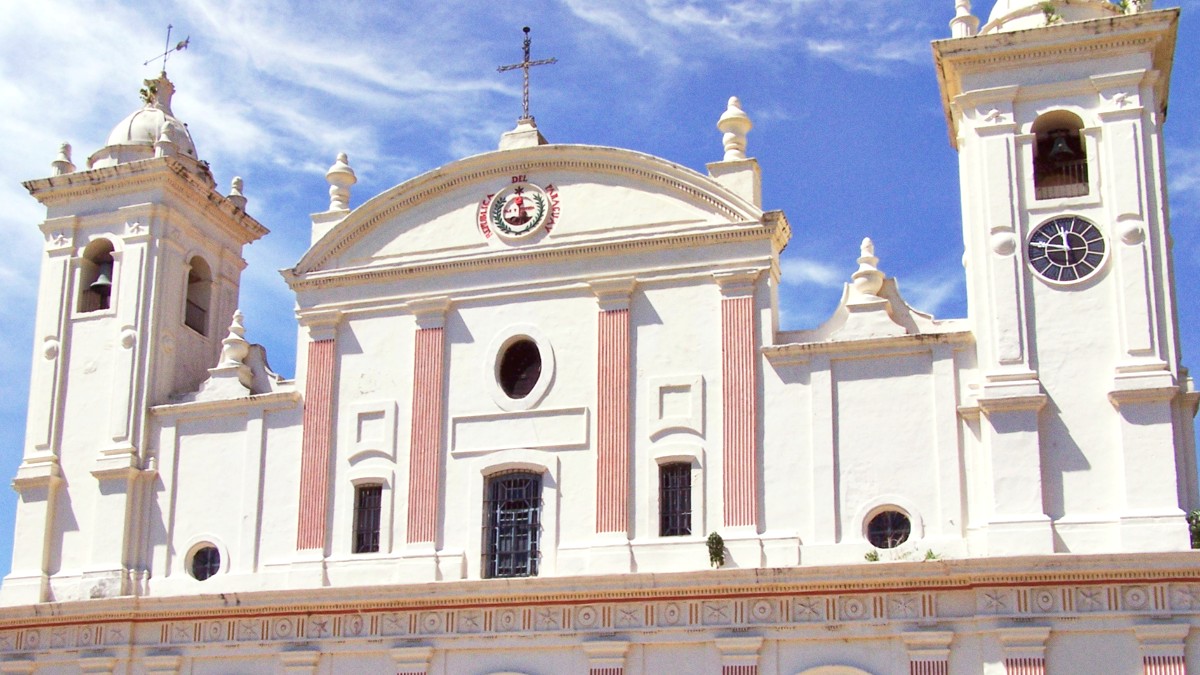
Paraguay
Paraguayan food is comforting, flavorful, and deeply connected to the land. It often features generous portions and relies heavily on staple crops.
Ingredients like corn (maize) and mandioca (cassava or yuca) form the backbone of many dishes, often combined with meat, notably beef. This creates a distinct culinary identity.
A light meal, often coffee or tereré with bread, chipa, or medialunas.
The heaviest meal of the day. Often a "menú del día" (daily special), including soup, a main course with meat and a side, and sometimes dessert.
A lighter meal or snack, often coffee/tea with pastries, enjoyed around 4:00 PM - 5:00 PM. Dinner is lighter than lunch, often sandwiches, empanadas, or a smaller cooked meal.
Despite its name, this is a savory, dense, cornbread-like cake, baked with corn flour, cheese, onions, milk, and eggs. An unique national dish, a "soup" you can slice. Locate it at traditional eateries and bakeries.
A savory, sliced "soup."
Small, baked, cheese-flavored bread rolls made with mandioca flour, eggs, and cheese. Chewy texture, often for breakfast or snack. Sold by street vendors, in bakeries, and supermarkets.
Chewy cheese bread rolls.
Paraguayan barbecue. Various cuts of grilled beef, often with chorizo and other grilled meats. Find it at specialized "parrilla" restaurants.
Grilled meat lover's delight.
Hot yerba mate tea, often with milk and sugar, resembling a warm, comforting tea.
Cañan is Paraguayan rum, often from sugarcane. Popular local beer brands include Pilsen and Brahma, widely available.
For an upscale culinary experience, consider restaurants like La Cabrera Paraguay (known for its quality meats) or Tierra Colorada Cocina Paraguaya (focuses on modern Paraguayan cuisine).
Comedores are small, local restaurants excellent for budget travelers. They have inexpensive and hearty "menú del día" during lunchtime.
You will find a wide selection of comfortable mid-range restaurants across the city, especially in the Villa Morra and Las Mercedes neighborhoods.
Traditional Paraguayan cuisine is meat-heavy, so dedicated vegetarian or vegan restaurants are not widespread. Naturally vegetarian options include chipa, sopa paraguaya (if without meat broth), mbejú, mandioca frita, and various salads.
When ordering, use phrases like "sin carne" (without meat) or "sin pollo" (without chicken). State "Soy vegetariano/a" (I am vegetarian) or "Soy vegano/a" (I am vegan) clearly.
Halal and Kosher food options are very limited. No dedicated Halal or Kosher restaurants are widely available. Travelers with these needs should plan for vegetarian options or prepare their own meals.
Gluten-Free & Allergies: Many traditional Paraguayan dishes are naturally gluten-free because they use mandioca flour. Clearly communicate your allergies: "Soy celíaco/a" or "Tengo alergia a..."
Some cultural centers may conduct workshops on traditional Paraguayan dishes.
Sample street food, visit markets, and experience the tereré ritual.
A spread of cold snacks and sandwiches accompanying tereré, a social dining concept.
BBQ is central to social gatherings. Many homes have parrillas, and restaurants specialize in this tradition.
Check local tourism calendars for food festivals or events. These often occur during national holidays or specific harvest seasons, a chance to taste various traditional foods.
The Festival de San Juan in June features specific traditional foods and games.
Excursions to rural areas surrounding the capital can give insights into agricultural practices, like mate production or cattle farming.
Inquire with local tour operators for such opportunities.
When indulging in street food, stick to freshly cooked items to minimize health risks. Consider bringing hand sanitizer.
Upscale restaurants in Asunción might feature modern interpretations of traditional dishes. It is always good to explore local "comedores" for authentic and inexpensive meals alongside locals.
Some private tour operators or cultural centers may conduct cooking classes focused on traditional Paraguayan dishes.
Many hotels or restaurants that cater to tourists may feature folklore shows, including traditional dance and music performances.
Asunción has Spanish language schools for short-term or long-term courses. This deepens immersion. Learning basic phrases in Guaraní creates an unique and appreciated experience by locals.
Food tours often sample street food, visit local markets, and experience the ritual of tereré, giving insight into daily food culture.
Visit Mercado 4 for a true sensory adventure, but exercise high vigilance for pickpockets.
Asado is more than a meal; it is central to social gatherings and family life. Many homes have parrillas (grills), and specific "parrilla" restaurants specialize in this tradition.
A significant part of social gatherings.
While less common directly from Asunción, excursions to rural areas surrounding the capital can give insights into agricultural practices.
Formal community-based tourism initiatives are limited within Asunción. Some specialized tours may highlight community efforts in revitalization areas like Barrio San Jerónimo.
Always check local calendars for cultural festivals and events during your visit. This discovers unique, temporary attractions.
When exploring local markets for food, arrive early for the freshest produce. Maintain good hand hygiene before and after handling food.